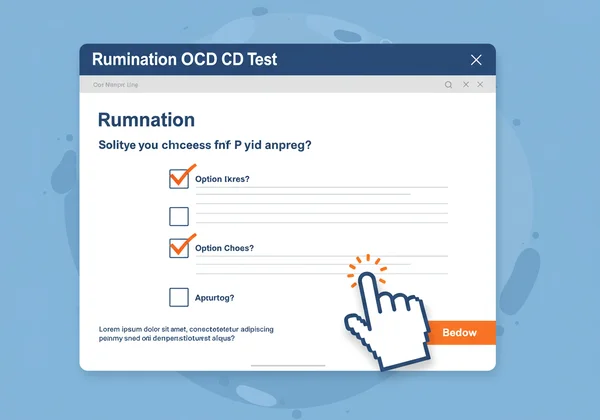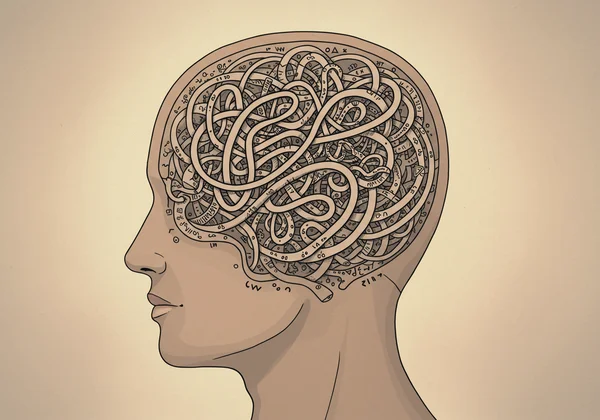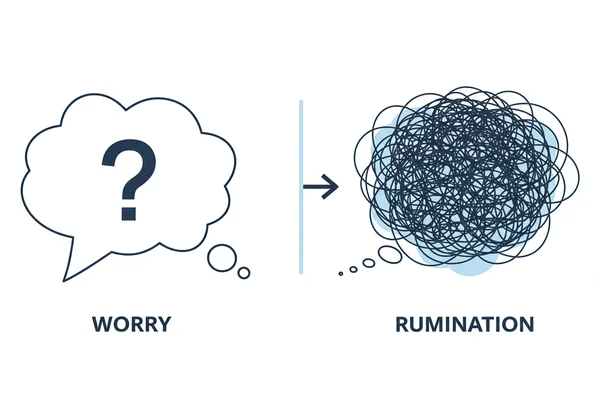Rumination OCD Test: Am I Ruminating or Do I Have OCD?
September 7, 2025 | By Samuel Griffin
Are you trapped in a cycle of repetitive, distressing thoughts you can't seem to escape? If your mind constantly replays a specific problem, memory, or question, you're likely asking yourself, "Am I ruminating or do I have OCD?" This persistent mental loop, far more intense than simple worry, could be a sign of Rumination OCD, a challenging but treatable condition.
This guide is designed to provide the clarity you need. We will explore:
- The key differences between obsessive rumination and general anxiety.
- Common themes and symptoms of Rumination OCD.
- How these mental compulsions impact your daily life.
- The first step you can take toward breaking the cycle.
Understanding your thought patterns is the first step toward relief. A scientifically-backed Rumination OCD test can offer confidential insight into your symptoms and help you find the right path forward.
Take Our Free Rumination OCD Test
Feeling stuck is overwhelming, but clarity is just a few clicks away. Our free and confidential test is designed to help you understand if your thought patterns align with symptoms of OCD. Get the insight you need to take the next step.
>> Take the Free & Confidential Rumination OCD Test Now <<

What is Rumination OCD? The Cycle of Endless Thoughts
Rumination OCD, often linked to a subtype known as Pure O (Purely Obsessional), is a form of OCD where the compulsions are primarily mental. Instead of performing physical rituals like hand-washing, the compulsion is an endless loop of thinking, analyzing, and trying to solve a problem that has no certain answer. This cycle of cognitive rumination is not productive problem-solving; it's a distressing mental ritual designed to reduce anxiety, but it only strengthens the obsession.
These are not just passing worries. They are intrusive, unwanted thoughts that hijack your attention, making it nearly impossible to focus on anything else. The core of the struggle is an intense, painful need for certainty on topics that are inherently uncertain.
Defining Pure O Rumination & Intrusive Thoughts
The term Pure O rumination can be misleading. Individuals with this form of OCD do perform compulsions, but they happen internally. These mental compulsions include mentally reviewing past events, trying to neutralize a "bad" thought with a "good" one, or endlessly reasoning through a moral dilemma. This is a direct reaction to intrusive thoughts rumination.
Intrusive thoughts are unwanted ideas, images, or urges that can cause significant distress. For someone with Rumination OCD, these thoughts aren't dismissed. They are latched onto, questioned, and analyzed for hours, creating a debilitating cycle.

Common Themes of Endless, Looping Thoughts
The obsessive thoughts in endless thoughts OCD can center on various themes. The specific content of the thought is less important than the pattern of getting stuck in it. Common examples of OCD rumination symptoms include:
- Relationship OCD (ROCD): Constantly questioning your love for your partner, their love for you, or if the relationship is "right."
- Moral/Scrupulosity OCD: Obsessing over whether you have violated your personal moral, ethical, or religious principles.
- Existential OCD: Getting stuck on unanswerable philosophical questions about reality, the meaning of life, or your own existence.
- Past Events: Replaying a past conversation or action endlessly, analyzing every detail for a potential mistake or sign of wrongdoing.
Rumination vs. Worry: How to Tell the Difference
It is crucial to distinguish the intense cycle of Rumination OCD from everyday worry. While worry is a normal human experience, obsessive rumination is an all-consuming mental process that feels uncontrollable and serves a different function than productive problem-solving. Understanding these differences is key to seeking the right help.
When Does Worry Become Obsession? Key Distinctions
Where is the line between normal worry and a clinical obsession? The key differences lie in the intensity, control, and function of the thoughts.
-
Control: Worry, while unpleasant, often feels manageable. You can typically shift your focus. Obsessive rumination feels completely uncontrollable, as if your mind has been hijacked by the thought.
-
Topic: Worries are usually about real-life, solvable problems (e.g., finances, work deadlines). Obsessions are often about hypothetical, catastrophic, or unanswerable questions that demand 100% certainty.
-
Function: The goal of worry is often to find a solution. The goal of rumination is to neutralize the anxiety caused by an obsession, but it never leads to a satisfying answer. It is a mental compulsion, not a problem-solving strategy.

How Rumination OCD Differs from Other Forms of OCD
Rumination OCD is distinct from other OCD subtypes that involve observable, physical compulsions. For example, a person with Contamination OCD might wash their hands repeatedly. Someone with Checking OCD might physically check that a door is locked dozens of times.
In Rumination OCD, the compulsive act is the thinking process itself. This internal struggle is invisible, which can make it incredibly difficult to identify. Many people suffer in silence for years, believing they are just "overthinkers." Recognizing these internal rituals as compulsions is a vital step toward understanding.
Why a Rumination OCD Test is a Crucial First Step
If you identify with these patterns, taking a rumination OCD test can be an empowering first move. It provides a structured framework to examine your thoughts and understand if they align with the characteristics of OCD. This isn't about self-diagnosis; it's about gathering information to help you on your journey.
What Our Online OCD Test Offers
Our free and confidential OCD test is based on scientifically validated screening principles like the Obsessive-Compulsive Inventory (OCI). After completing the test, you have a unique option to answer a few more questions to unlock a comprehensive, AI-powered personalized report. This report offers deep insights into your specific symptoms, translating a simple score into actionable, personal understanding.
Why a Preliminary Screening is Important (Not a Diagnosis)
It is essential to understand that this tool is a preliminary screening test, not a diagnostic instrument. A formal diagnosis of OCD can only be made by a qualified mental health professional after a comprehensive evaluation.
Think of this test as a starting point. It's a safe and reliable first step to help you organize your concerns. The results can be a valuable resource to bring to a conversation with a doctor or therapist, providing them with a clear picture of what you have been experiencing. Our goal is to empower you with information, not to replace professional medical advice.
How Rumination OCD Impacts Daily Life
The relentless nature of cognitive rumination can have a profound impact on every aspect of your life. It drains mental energy, erodes self-confidence, and steals your time and attention. Living with a mind that is constantly at war with itself is exhausting and can lead to significant emotional distress and functional impairment.

The Vicious Cycle: How Rumination Fuels Anxiety
Rumination creates a vicious feedback loop. An intrusive thought causes a spike of anxiety. To relieve this anxiety, you engage in the mental compulsion of ruminating—analyzing, reviewing, or trying to "solve" the thought. This compulsive thinking provides temporary, fleeting relief, which reinforces the brain's belief that rumination is a necessary safety behavior. However, it ultimately gives the obsession more power, ensuring it will return stronger, and the cycle continues, leading to more anxiety and more rumination over time.
Effects on Mental Well-being, Relationships, and Productivity
The constant mental churn takes a heavy toll. Mentally, it can lead to severe anxiety, depression, and feelings of hopelessness. The inability to be "present" can strain relationships with friends and family, who may see you as distracted, distant, or irritable.
Productivity at work or school often suffers. When your mind is occupied with an endless loop, concentrating on tasks, meeting deadlines, or thinking creatively becomes nearly impossible. The mental exhaustion can be as debilitating as physical fatigue.
Empowering Yourself: From Endless Thoughts to Action
Living with Rumination OCD can feel like being a prisoner in your own mind. But understanding the nature of these thoughts is the key that unlocks the cage. This is a recognized condition, you are not alone, and there are clear, effective steps you can take toward relief.
Gaining clarity about your symptoms is an act of empowerment. It is the crucial first step on the path to breaking the cycle and regaining control over your mind and your life. We invite you to use our free, confidential tool to take that first step today.
Begin Your Free & Confidential Test Now
Frequently Asked Questions About Rumination OCD
Can you have rumination without OCD?
Yes. Rumination is also a key feature of depression and generalized anxiety disorder. However, in OCD, the rumination is a mental compulsion directly linked to an obsession and driven by a need to neutralize doubt or distress. The themes in OCD are often more ego-dystonic (opposite to one's values) than typical anxious worries.
How do I know if my rumination is Rumination OCD?
Examine the function of your thoughts. Are you stuck in loops trying to find 100% certainty on an unanswerable question? Does the thinking feel like a desperate attempt to reduce the anxiety caused by an intrusive thought? If so, it may align with OCD. An accurate OCD test can help you explore these patterns.
Can an online test truly help identify Rumination OCD?
A well-designed online screening tool based on scientific principles can be highly effective at helping you identify symptoms consistent with Rumination OCD. While not a substitute for a professional diagnosis, it provides an objective look at your experiences and is a powerful first step toward self-awareness.
What is the best treatment for Rumination OCD?
The gold-standard treatment is a form of Cognitive Behavioral Therapy (CBT) called Exposure and Response Prevention (ERP). ERP therapy, often combined with medication like SSRIs, teaches you how to confront your obsessive thoughts without engaging in the compulsive rumination, which breaks the cycle over time.
What makes the Ocdtest.net test unique for rumination?
Our test is based on established psychological screening principles. The key differentiator is our optional AI-powered personalized report, which provides deep, tailored insights into how rumination patterns may be manifesting in your life. It goes far beyond a simple score to offer genuine understanding and direction.